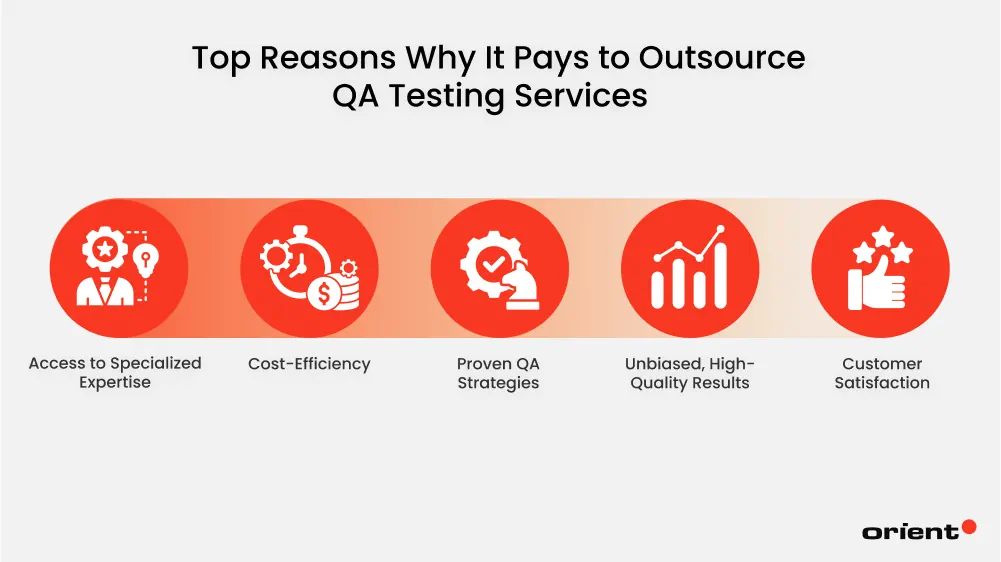
Why Quality Assurance Outsourcing Is Not Just Smart - It's Strategic
Think that outsourcing QA and testing is just about cost-saving? Learn about other benefits it brings, and you will have to think again.

Content Map
More chaptersThere is a truth in software development that business owners and project managers must agree on: Even if you have a brilliant product idea or heavily invest in the development process, none of them matters when the final result crashes or frustrates your users.
Unaddressed bugs can derail a product launch, erode user trust, and even jeopardize the entire software development process, ultimately resulting in a product that fails to meet quality expectations. The difference between success and disaster comes down to how seriously you handle QA processes.

Yet, too often, quality assurance (QA) is treated like a last-minute add-on instead of a priority because building an in-house team of QA professionals can take serious time and money, not to mention effort and leadership attention. So, what’s the best way to make QA not just a checkbox but a critical pillar in your development lifecycle? The answer is outsourcing.
Not only because outsourcing QA services is cheaper but also because it brings forth many other advantages that contribute to delivering high-quality software. That’s what we are going to find out.
Key Takeaways:
- Outsourcing QA gives you instant access to skilled testers and specialized knowledge without the delays of building an in-house team.
- You reduce fixed costs like salaries, equipment, and training while gaining the flexibility to scale QA efforts up or down as needed.
- Global talent and time zone advantages allow continuous testing, faster feedback loops, and quicker product releases.
- QA testing outsourcing vendors bring ready-made tools, automation testing frameworks, and structured processes that improve test coverage and minimize risks.
- Independent QA teams provide objective, user-like feedback that helps uncover hidden issues and raise product quality.
- With stronger QA in place, you ship more reliable software, build user trust, and improve long-term customer satisfaction.
What Does Outsourcing Quality Assurance Mean?
First and foremost, let’s correct a widespread belief. People often use QA and software testing interchangeably; still, they are related but different.
Quality assurance (QA) is a general term used to describe the evaluation of a software product or application to determine if it meets or exceeds the required quality standards. Software testing is a subset of QA that focuses on identifying errors, bugs, and glitches that could potentially impact the final product’s functionality. QA includes but is not limited to testing; it also covers the overall strategy, planning, processes, standards, and risk management to ensure software quality.
In order to be effective, QA testing needs to be carried out throughout the entire software development life cycle (SDLC) – from the initial requirements gathering stage all the way through to post-deployment. The QA testing process can involve different methodologies and advanced testing tools, and each is employed to serve different purposes. Common methods include:

- Manual Testing: Human test engineers execute test cases step by step to detect bugs based on user behavior and interface interaction.
- Automated Testing: Use scripts and tools to automatically run tests and validate functionality, especially for repetitive or large-scale test scenarios.
- Unit Testing: A developer-level test that checks individual components or functions of code in isolation to ensure they work as intended.
- Functional Testing: Check features and user flows to verify that the software product behaves according to specified requirements.
- Integration Testing: Ensure seamless integration of different modules or systems when combined.
- Usability Testing: Evaluate how easy, intuitive, and satisfying a software product is for real users to interact with.
- System Testing: Test the complete integrated application as a whole to validate end-to-end system functionality.
- Regression Testing: Re-run previously completed tests to confirm that recent code changes haven’t broken existing functionality.
- Accessibility Testing: Assess whether a product is usable by people with disabilities
- Performance Testing: Measure how the system performs under load in terms of speed, stability, scalability, and responsiveness.
- Mobile Testing/Mobile App Testing: Evaluate the functionality, usability, and compatibility of a mobile application across various devices and operating systems.
- Exploratory Testing: QA testers actively explore an application to uncover unexpected issues without relying on predefined scripts.
- Security Testing: Detects vulnerabilities, threats, and risks in the system to prevent data breaches and ensure protection.
- API Testing: Validate the functionality, reliability, and security of application programming interfaces (APIs) through direct interaction.
- Localization Testing: Check and ensure proper adaptation of software for specific languages, regions, and cultural norms.
- Compatibility Testing: Confirm that the product works seamlessly across different browsers, devices, and operating systems.
Even though they can overlap, it’s still necessary to layer these methods intentionally to test the product from various angles and at different stages. It ensures no defect slips through.
And now, let’s get to the main point: What is QA outsourcing? In the simplest terms, quality assurance or QA outsourcing simply means delegating your software testing activities to an external team or specialized vendor - either partially or entirely. The outsourced team comes pre-assembled with QA engineers, proven processes, advanced tools, and hands-on experience needed to jump straight into action. They can work as an extension of your existing development team or take full ownership of the testing cycle.
Usually, an outsourcing provider offers different models. You can leverage QA outsourcing services on a project-by-project basis or in a Build-Operate-Transfer (BOT) model where the service provider eventually hands over the team and operations to you. You can also engage in long-term outsourcing partnerships, depending on your testing demands.
Top Reasons Why It Pays to Outsource QA Testing Services
In software development, quality is no luxury but an utmost necessity. Business leaders opt for outsourcing software testing and QA activities as a strategy to help them ensure the development and deployment of high-quality software while lowering costs. But there are more good reasons behind such decisions. Let’s unpack why.
Access to Specialized Expertise
Imagine how troublesome and costly it can be to assemble an in-house QA team of full positions, not to mention operating and maintaining it. Additionally, newly formed in-house teams often lack the depth of skills or experience to hit the ground running. They may need weeks or even months to get up to speed with your requirements, processes, and tech stack. Most companies and projects do not have budgets, time, or both to build a team that can handle full-stack QA operations.

Now, imagine a different scenario where you can bypass the hurdles entirely by outsourcing the QA functions to professional software testing companies. You can gain immediate access to the specialized skills and resources you require. QA outsourcing companies take over the hard work, from sourcing talent to assembling a team that offers proven expertise and matches your project’s specific needs from day one.
What’s else? In QA testing, most roles are highly specialized and project-dependent, so finding the right experts locally is a never-ending challenge. By outsourcing, you can tap into top-tier QA and testing talent from across the globe. For example, Vietnam. In such a talent-scarce tech landscape, it is a vital advantage.
Cost-Efficiency
Outsourcing QA and software testing services helps effectively manage your budget and fixed operational costs.
In reality, maintaining an internal QA team necessitates substantial capital expenditures, including different categories, such as:
- Salaries: From $60,000 to $120,000 per engineer (per year), depending on region and seniority.
- Testing Infrastructure: From $15,000 to $50,000 per year for hardware, software licenses, test environments, etc.
- Training Programs: From $5,000 to $20,000 per year.
Other expenses, such as employee benefits and bonuses.
(Statistics from various sources: Testfort, QATestLab, BizCoder, etc.)
When outsourcing, these fixed costs can be converted into variable expenses, with companies paying only for active testing phases and the QA resources they use. Potentially, it enables you to save up to 20 - 30% on salaries for in-house staff and reduce infrastructure and operational costs by approximately 40%.

Thanks to flexible engagement models, you can scale up or down the outsourced QA team based on the project demands. You will not be burdened with idle resources while being able to quickly ramp up during peak times. This greatly contributes to keeping your budget lean. You are able to avoid unnecessary spending and redirect your budget toward core development or strategic initiatives, such as R&D initiatives.
What’s more? Outsourcing allows tapping into the global talent pool, as mentioned, but at a significantly lower cost. Most companies in high-cost regions, like the U.S., Japan, Canada, etc., choose to hire specialists from offshore destinations, like Vietnam, India, and China, for top-tier expertise without the premium price tag.
In addition to cost advantage, time zone differences between you and the outsourcing vendor empower your project to move forward around the clock. While your local team rests, outsourced QA engineers can execute tests and log results, and vice versa. It creates feedback loops that enable continuous improvement and quicker releases.
Proven QA Strategies
Quality assurance outsourcing vendors don’t just offer testers. They come with time-tested QA practices, structured processes, proven frameworks, and a quality-oriented approach shaped across dozens, if not hundreds, of projects.

From day one, they know how to integrate seamlessly into your workflows, support your release cycles, and uncover issues before they reach your users. Whether you need support with test automation, mobile compatibility, performance bottlenecks, localization quality assurance (LQA), or other complex QA challenges, outsourcing providers already have the expertise, tools, and team in place. Instead of building capacity from scratch, you can inherit one that is already running at peak efficiency.
Unbiased, High-Quality Results
Outsourcing brings objectivity into the software testing process. In-house developers and product teams are familiar with the code, the logic, and the intended behavior, which can unintentionally lead to blind spots or assumptions during testing.

Outsourced QA teams, on the other hand, can approach your product with a fresh, independent perspective like a real end user would. They are professionals trained to think critically, question functionality, and challenge assumptions. With an objective viewpoint and no bias toward the code or internal decisions, they not only confirm that features work but validate that they work as users expect. This results in more thorough test coverage, earlier detection of edge-case bugs, and a higher level of confidence before release.
Furthermore, as your in-house team is offloaded, they can contribute 100% of their effort and time to developing the product and prioritize value-added tasks. In this way, you raise the bar on quality, reduce the risk of costly post-release issues, and deliver a more polished and reliable product.
Customer Satisfaction
At the end of the day, everything comes down to user satisfaction. In order to deliver the best experience and meet or even exceed the users’ expectations, you must ensure your software product functions flawlessly and stay aligned with evolving standards, trends, and platforms. That means smooth functionality, up-to-date performance, and minimal bugs or usability issues.

Achieving this goal requires more than effort but a solid QA strategy and a capable team. With all the advantages mentioned earlier, outsourcing QA services ultimately aims to help you roll out only high-quality results.
Final Notes
Now that you know exactly what to expect when outsourcing quality assurance services, the next step is tracking down a reliable and capable partner who can offer a full range of QA testing services and deliver real results, not just promises. You need a team that brings expertise, flexibility, and accountability to every phase of your project.
That’s exactly what you’ll find at Orient Software. We are a software development outsourcing company with over two decades of experience, a deep bench of skilled QA specialists, and a proven track record across industries. We excel at but are not limited to, QA testing and other services, such as custom software development, AI development, and staff augmentation.
Let’s meet up to discuss what we can offer you. Reach out today for a free consultation.






